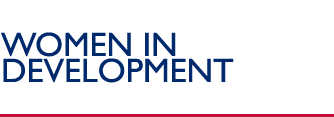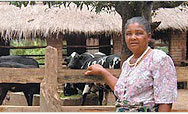 |
Child Marriage: Overview
The marriage of girls under 18 is a common practice in many developing countries. USAID recognizes the critical issue of child marriage especially as it impedes our development efforts and undermines the health and well-being of women and girls worldwide.
 |
| 100 million girls will be married before age 18 in the next ten years, with some as young as 10 or even younger.
|
What is the scope of the problem?
- There are an estimated 51 million child brides worldwide, the majority of them in West and East Africa and in South Asia.
- 100 million girls will be married before age 18 in the next ten years, with some as young as 10 or even younger.
- Niger has the highest rate of child marriage in the world with 77% of girls married before the age of 18.
- Driving factors are many, and include poverty, poor education, concerns regarding girls' safety, as well as traditional practices.
How does child marriage impede our development efforts?
- In many countries where USAID has health and education programs, a high prevalence of child marriage results in girls having less access to education, economic opportunities and social networks.
- Married girls often are forced to drop out of school.
- Child brides are pressured into becoming pregnant and girls younger than 15 are five times more likely to die in childbirth than women in their 20s.
- Marriage often prevents girls from accessing essential health information and services, resulting in unwanted pregnancy, higher maternal and infant deaths, higher rates of HIV/AIDS and obstetric fistula, and higher incidence of gender-based violence.
- Child brides are more likely to live in poverty and continue to live in poverty.
What is USAID doing to decrease child marriage?
USAID has also sought to reduce the practice of early marriage through many of its country programs, especially through health, education, and women's legal rights. Specific examples of country-focused efforts to reduce child marriage include:
Additional Resources
Child Brides: Stolen Lives a PBS Special.
The publications below are listed by region and country, and then in alphabetical order by title.
Global
General
 Programs to Address Child Marriage: Framing the Problem 02/29/2008 (202KB)
This presentation describes the various factors leading to early marriage in three contexts -- in Bangladesh, among Guatemala's Mayan population, and among the Hmong and Dao minorities in Vietnam -- and the implications for programs aiming to delay marriage in these different contexts (for instance, in Bangladesh, dowry price rises with age). In addition, it explains that a lack of opportunities and social isolation are important common correlates of early marriage among disadvantaged ethnic minorities in Asia and Latin America.
Africa
Africa Regional
 Advancing women's rights globally : consolidated first, second, third and fourth quarterly report, November 1, 2002-October 31, 2003 [year two] 08/25/2004 (151KB)
This document reports on activities in Ghana, Nigeria, Tanzania, and Uganda during the second year of the USAID grant "Advancing Women's Rights Globally." Under this grant, Georgetown University Law Center's International Women's Human Rights Clinic and its four partners (LAWA-Ghana, WRAPA, WLAC, and LAW-Uganda) work on various projects to advance women's rights and fight discrimination, including legislation, litigation, strengthening civil society, and public education. The women's rights issues covered include trafficking, domestic violence, marriage, divorce, polygamy, brideprice, adultery, child marriage, property, inheritance, employment, maternal and child health, HIV/AIDS, female genital mutilation, and political participation.
 Advancing women's rights globally : consolidated first, second, third and fourth quarterly reports, November 1, 2003-October 31, 2004 [year three] 08/19/2005 (147KB)
This document reports on activities in Ghana, Nigeria, Tanzania, and Uganda during the third year of the USAID grant "Advancing Women's Rights Globally." Under this grant, Georgetown University Law Center's International Women's Human Rights Clinic and its four partners (LAWA-Ghana, WRAPA, WLAC, and LAW-Uganda) work on various projects to advance women's rights and fight discrimination, including legislation, litigation, strengthening civil society, and public education. The women's rights issues covered include trafficking, domestic violence, marriage, divorce, polygamy, brideprice, adultery, child marriage, property, inheritance, employment, maternal health, HIV/AIDS, female genital cutting, and political participation.
 Advancing women's rights globally : consolidated first, second, third, and fourth quarterly reports, November 1, 2004-October 31, 2005 [USAID extension] 06/01/2006 (332KB)
This document reports on activities in Ghana, Nigeria, Tanzania, and Uganda during the extension period of the USAID grant "Advancing Women's Rights Globally." Under this grant, Georgetown University Law Center's International Women's Human Rights Clinic and its four partners (LAWA-Ghana, WRAPA, WLAC, and LAW-Uganda) work on various projects to advance women's rights and fight discrimination, including legislation, litigation, strengthening civil society, and public education. The women's rights issues covered include trafficking, domestic violence, marriage, divorce, polygamy, brideprice, adultery, child custody, property, inheritance, HIV/AIDS, maternal health, female genital mutilation, and political participation.
Benin
 Success Story: Benin 06/01/2006 (77KB)
This one-pager describes the achievements of USAID's Women's Legal Rights Initiative in Benin. With encouragement from the project, Benin has adopted national reforms that render many longstanding local customs illegal. However, awareness is low and enforcement is weak. The Women's Legal Rights Benin team, with local partners, visits remote areas of the country informing women and men about the new laws.
Democratic Republic of the Congo
 Case Study: Helping Child Soldiers Reintegrate 04/25/2008 (75KB)
This two-page case study describes USAID-supported work in the Democratic Republic of the Congo (DRC) to assist and reintegrate boys and girls abducted during the 10 years of conflict in eastern DRC, along with children conceived by abducted girls during their time with the fighting forces. With USAID support, COOPI, an Italian NGO working in Ituri district, has helped reintegrate victims into their communities safely as well as prevent future abduction, trafficking, and sexual violence. Through an extensive communication campaign and a victim support center, COOPI has reached often-hidden girls by working to change the behavior of communities toward abductees, reducing the stigma and shame felt by victims, and helping victims improve their self-identification and skills.
Ethiopia
 Promising Interventions: Preliminary Findings from the Amhara Region, Ethiopia 02/29/2008 (84KB)
This presentation describes interventions to stop child marriage in Ethiopia that have been implemented by World Learning and Pathfinder International. The range of interventions includes school-based, community-based, and partnerships with national and regional legal/civil society organizations. Promising preliminary findings on child marriage are also presented.
 Stopping Child Marriage: Lessons from Ethiopia 02/29/2008 (165KB)
This presentation discusses the problem of child marriage in Ethiopia, which is due to poverty and lack of opportunity, and the lessons learned from development programs there. It explains the social change approach to stopping child marriage, which involves understanding the cultural context, including and forming strategic alliances with different members of society, and integrating with larger programs.
Malawi
 Gender-Based Violence In Schools: An Entry Point for Addressing Child Marriage 02/29/2008 (840KB)
This presentation explains how the Safe Schools Program is helping to prevent child marriage in Malawi. It profiles several young girls who the Safe Schools Program helped stay or re-enroll in school. A total of 35 child marriages were avoided between October and December 2007.
Asia
Afghanistan
 Gender Advocacy in Afghanistan Newsletter: Volume 6 09/01/2005 (1.1MB)
The Gender Advocacy in Afghanistan newsletter is produced by UNIFEM Afghanistan through support provided by USAID's Office of Women in Development. The newsletter presents factual information, statistics, and references relevant to four different gender campaign issues in order to facilitate gender-based campaigns by Afghan journalists, government, and civil society organizations.
Volume 6 contents:
- Child Marriage in Afghanistan
- Men and Public Harassment in Afghanistan
- Former Male Child Soldiers in Afghanistan
- Protection of Women in Afghanistan
 Gender Advocacy in Afghanistan Newsletter: Volume 7 11/01/2005 (1.2MB)
The Gender Advocacy in Afghanistan newsletter is produced by UNIFEM Afghanistan through support provided by USAID's Office of Women in Development. The newsletter presents factual information, statistics, and references relevant to four different gender campaign issues in order to facilitate gender-based campaigns by Afghan journalists, government, and civil society organizations.
Volume 7 contents:
- Widows in Afghanistan
- Street Children in Kabul
- The Commitment to Combat Violence against Women
- Women and the Afghan Parliament
- A Workshop on Forced and Child Marriage
Bangladesh
 Programs to Address Child Marriage: Framing the Problem 02/29/2008 (202KB)
This presentation describes the various factors leading to early marriage in three contexts -- in Bangladesh, among Guatemala's Mayan population, and among the Hmong and Dao minorities in Vietnam -- and the implications for programs aiming to delay marriage in these different contexts (for instance, in Bangladesh, dowry price rises with age). In addition, it explains that a lack of opportunities and social isolation are important common correlates of early marriage among disadvantaged ethnic minorities in Asia and Latin America.
Vietnam
 Programs to Address Child Marriage: Framing the Problem 02/29/2008 (202KB)
This presentation describes the various factors leading to early marriage in three contexts -- in Bangladesh, among Guatemala's Mayan population, and among the Hmong and Dao minorities in Vietnam -- and the implications for programs aiming to delay marriage in these different contexts (for instance, in Bangladesh, dowry price rises with age). In addition, it explains that a lack of opportunities and social isolation are important common correlates of early marriage among disadvantaged ethnic minorities in Asia and Latin America.
Latin America & Caribbean
Guatemala
 Programs to Address Child Marriage: Framing the Problem 02/29/2008 (202KB)
This presentation describes the various factors leading to early marriage in three contexts -- in Bangladesh, among Guatemala's Mayan population, and among the Hmong and Dao minorities in Vietnam -- and the implications for programs aiming to delay marriage in these different contexts (for instance, in Bangladesh, dowry price rises with age). In addition, it explains that a lack of opportunities and social isolation are important common correlates of early marriage among disadvantaged ethnic minorities in Asia and Latin America.
Back to Top ^
|




